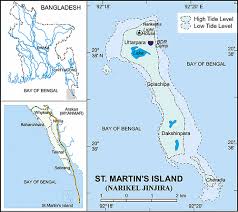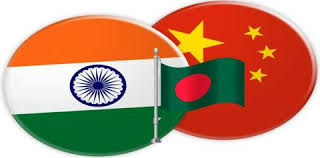My article published on the IIRF website
on 14 Apr 25.
Nestled in the northeastern Bay of Bengal, Saint Martin’s Island, known locally as Narikel Jinjira or Daruchini Dwip, is a small coral island spanning just three square kilometers. This unassuming landmass holds outsized geopolitical significance, located approximately nine kilometers south of Bangladesh’s Cox’s Bazar-Teknaf peninsula and eight kilometers west of Myanmar’s northwest coast. Despite its modest size and population of around 3,700, the island’s strategic location near critical maritime routes and its proximity to the Bangladesh-Myanmar maritime border have drawn the attention of regional and global powers, including the United States, China, India, and others.
Historical Context and Sovereignty
Saint Martin’s Island has a rich history intertwined with regional geopolitics. Millennia ago, it was an extension of the Teknaf peninsula, but rising sea levels submerged parts of the land, creating the island as it exists today. Named after Saint Martin by British colonial authorities in the 19th century, it was previously called Jazira by Arabian merchants who settled there in the 18th century. The island became part of British India in 1900, Pakistan after the 1947 partition, and Bangladesh following its independence in 1971. A 1974 agreement between Bangladesh and Myanmar, later affirmed by the International Tribunal for the Law of the Sea (ITLOS) in 2012, solidified Bangladesh’s sovereignty over the island, despite occasional tensions with Myanmar over maritime boundaries.
The island’s economy is modest, primarily driven by fishing, rice cultivation, coconut farming, and seaweed harvesting. Tourism is gaining traction due to its pristine beaches and coral reefs. However, its strategic value far outweighs its economic contributions, making it a focal point in South Asian geopolitics.
Strategic Location in the Bay of Bengal
Saint Martin’s Island’s location is its most defining asset. Situated near the mouth of the Naf River and close to the maritime boundary between Bangladesh and Myanmar, it lies at the crossroads of vital sea lanes in the Bay of Bengal. The bay is a critical maritime zone connecting the Indian Ocean with Southeast Asia and serving as a gateway to the Indo-Pacific. It hosts some of the world’s busiest shipping routes, including those passing through the Strait of Malacca, a chokepoint for global trade, particularly for energy supplies. Control over Saint Martin’s Island offers a vantage point for monitoring maritime traffic, conducting surveillance, and projecting naval power in this strategically significant region.
The island’s proximity to the Matarbari Deepsea Port, currently under development in Bangladesh with Japanese investment, further amplifies its importance. The port is set to enhance Bangladesh’s role in regional trade, and Saint Martin’s Island could serve as a complementary outpost for securing maritime routes. Additionally, the island falls within Bangladesh’s Exclusive Economic Zone (EEZ), granting access to marine resources like fish, oil, and gas, which adds an economic dimension to its strategic value.
Environmental and Economic Significance
Beyond its geopolitical role, Saint Martin’s Island is an ecologically sensitive area. As Bangladesh’s only coral island, it supports diverse marine life, including coral reefs, sea turtles, and various fish species. However, environmental degradation poses a threat—studies estimate that 70% of its coral reefs were lost between 1980 and 2018 due to anthropogenic factors like overfishing and pollution. Conservation efforts are critical to preserving this biodiversity, which also underpins the island’s tourism potential and fishing-based economy.
Tourism is a growing sector, with the island attracting visitors for its natural beauty and cultural heritage. However, a nine-month tourist restriction starting February 1, 2025, has been imposed to address environmental concerns and regional tensions, particularly with Myanmar. The island’s isolation during the rainy season, when rough seas cut off access to the mainland, underscores its vulnerability and strategic significance as a self-contained outpost.
Interests of World Powers
The Bay of Bengal has emerged as a theater of great power competition, and Saint Martin’s Island is a pawn in this geopolitical chessboard. The interests of major powers—particularly the United States, China, and India—stem from the region’s growing importance in global trade and security.
United States. The United States views the Bay of Bengal as a critical component of its Indo-Pacific Strategy, aimed at countering China’s growing influence. Allegations by former Bangladeshi Prime Minister Sheikh Hasina in 2024 suggested that the U.S. sought control over Saint Martin’s Island to establish a military base or airbase, a claim denied by Washington. Such a presence would allow the U.S. to monitor Chinese naval activities, secure shipping lanes, and strengthen its strategic posture in the Indo-Pacific. The island’s proximity to the Strait of Malacca makes it an ideal site for surveillance and power projection. While the U.S. has officially dismissed these claims, the island’s strategic value aligns with its broader objectives, including partnerships like the Quadrilateral Security Dialogue (Quad) with India, Japan, and Australia.
China. China’s expanding presence in the Indian Ocean, driven by its Belt and Road Initiative (BRI), has heightened its interest in the Bay of Bengal. Beijing has invested heavily in regional infrastructure, including Bangladesh’s Cox’s Bazar port and a submarine base near Dhaka. Saint Martin’s Island could be a strategic foothold for China to monitor maritime routes and counter U.S. and Indian influence. Reports of Chinese intelligence facilities on Myanmar’s Coco Island, near the Strait of Malacca, underscore Beijing’s ambitions in the region. Control over Saint Martin’s Island would enhance China’s ability to project power and secure its energy imports, which rely heavily on these sea lanes.
India. As a regional power, India is vested in maintaining influence over the Bay of Bengal, which it considers part of its strategic backyard. Saint Martin’s Island’s proximity to India’s Andaman and Nicobar Islands, a key military outpost, makes it a concern. India is wary of foreign powers—particularly China or the U.S.—establishing a presence on the island, which could undermine its regional dominance. New Delhi has supported Bangladesh’s sovereignty over the island and provided economic and military assistance to counterbalance Chinese influence. Any foreign control over Saint Martin’s Island could serve as a “checkpoint” for India’s maritime activities, heightening tensions.
Other Actors. Myanmar’s proximity to Saint Martin’s Island has led to occasional tensions, including cross-border firing and disputes over maritime boundaries. The ongoing conflict in Myanmar’s Rakhine State, involving the Arakan Army, has spilled over into the island’s waters, raising security concerns for Bangladesh. Japan’s investment in the Matarbari port also reflects its interest in the region’s economic potential, which is indirectly tied to the island’s strategic location.
Geopolitical Tensions and Allegations. Saint Martin’s Island has been at the center of political controversies in Bangladesh. Sheikh Hasina’s 2024 claims that her ouster was linked to U.S. pressure over the island sparked widespread debate. She alleged that foreign powers sought to lease or control the island, a narrative her son later disputed. These accusations reflect the island’s role as a lightning rod for sovereignty, foreign influence, and regional security discussions.
Conclusion
Saint Martin’s Island may be small, but its strategic location in the Bay of Bengal makes it a coveted prize for world powers. Its proximity to vital maritime routes, economic potential, and environmental significance amplify its importance in a region of great power competition. The United States, China, and India, among others, recognise the island’s value as a potential outpost for surveillance, power projection, and securing trade routes. For Bangladesh, maintaining sovereignty over Saint Martin’s Island is a matter of national pride and a strategic necessity. As geopolitical tensions rise in the Indo-Pacific, this tiny coral gem will likely remain a focal point of intrigue and contestation, underscoring the complex interplay of power, sovereignty, and strategy in the modern world.
Please Add Value to the write-up with your views on the subject.
For regular updates, please register your email here:-
Link to the article on the website:-
Saint Martin’s Island: A Strategic Gem in the Bay Of Bengal (by Air Marshal Anil Khosla)
References and credits
To all the online sites and channels.
Pics Courtesy: Internet
Disclaimer:
Information and data included in the blog are for educational & non-commercial purposes only and have been carefully adapted, excerpted, or edited from reliable and accurate sources. All copyrighted material belongs to respective owners and is provided only for wider dissemination.
References:-
- Online Research Foundation (ORF), Article: “St. Martin’s Island: A new flashpoint in the Bay of Bengal?” August 21, 2024.
- The Financial Express, “St. Martin’s Island: A strategic jewel in the Bay of Bengal – Explained”, August 12, 2024.
- India Today, “All about St Martin’s Island, its geopolitical importance amid Bangladesh crisis”, August 11, 2024.
- Business Today, “The island that toppled a government: Was Sheikh Hasina ousted over this tiny coral gem in the Bay of Bengal?” August 12, 2024.
- ETV Bharat, “Explained | Hasina And The Geostrategic Importance Of St Martin Island In Bangladesh”, August 11, 2024.
- Firstpost, “Bangladesh crisis: What could the US gain from acquiring St. Martin’s Island?” August 11, 2024.
- The Indian Express, “What is Bangladesh’s St Martin’s Island, under spotlight after Sheikh Hasina’s resignation?”, August 15, 2024.
- Moneycontrol, “St Martin’s in Bangladesh: Did this island lead to Sheikh Hasina’s downfall?” August 11, 2024
- ABP Live, “St Martin’s Island: Why This Tiny Island In Bangladesh Is Under Spotlight After Sheikh Hasina’s Ouster”, August 11, 2024.
- The Business Standard, “Bangladesh strategically vital in Indo-Pacific”, February 28, 2022
- Eurasia Review, “Bangladesh’s Balancing Politics with Big Powers in Strategic Bay Of Bengal – OpEd”, December 28, 2021
- War on the Rocks, “The Bay of Bengal Could Be the Key to a Free and Open Indo-Pacific”, June 17, 2022



